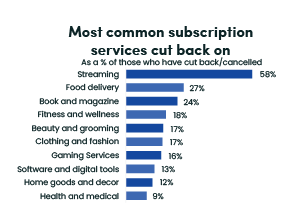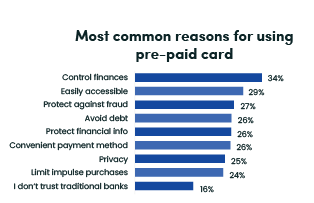How to save money in the UK by cancelling subscriptions
29 July 2024The UK has been facing a cost-of-living crisis since late 2021. Consumer prices increased by more than 20% in the three years up to May 2024, according to government data. Although inflation has fallen recently, it’s still higher than many comparable countries. Household budgets remain under serious pressure. As a result, many Brits are changing their financial habits. They're wondering how to save money and manage their budgets better. One effective tactic is cancelling unnecessary subscriptions.

We recently conducted some research into changing behaviour around subscription services in the UK. We found that two in five (41%) Brits have cut back or cancelled subscription services to help manage their finances since the start of the cost-of-living crisis. That rises to almost half (47%) of those under 30.
More key findings:
Why are Brits changing their habits?
The cost-of-living crisis is the main driver of these changes. It's forcing people to reassess their spending and think about how to save money. Subscription services are often seen as non-essential. They're an easy target for budget cuts.
Which subscriptions are most affected?
Streaming services are the most common thing to be cut. This includes platforms like Netflix, Amazon Prime Video, and Disney+. Many young people in the UK are also investigating how to cancel their DAZN subscription. Food delivery subscriptions come next, followed by book and magazine subscriptions.
Forgotten subscriptions can be a nasty financial surprise. Nobody wants to spend money on services they no longer use or want. In our research, we found that 56% of 18-34-year-olds have noticed a subscription payment coming out of their bank that they couldn’t recognise or that they had forgotten about. The average amount wasted by these 18-34-year-olds is £75.

There are strategies to prevent these losses, including:
But there’s an even more foolproof option than that…
Prepaid cards like paysafecard and Neosurf are gaining popularity in the UK, especially with younger people. In our research, we found that one in five (21%) Brits use a prepaid credit card. People aged 18 to 34 (43%) are more likely to use one compared to those aged 35 to 54 (18%) and 55+ (9%). Of those that do use them, more than half (54%) have started using them since the start of the cost-of-living crisis.
Brits mostly use these cards for:

One in five (21%) are using them to buy phone credit. Better control of finances is the number one reason people use a prepaid card. They’re a great solution when you’re wondering how to save money, especially for controlling subscription spending. Prepaid cards limit spending to the loaded amount, which means you can avoid nasty subscription renewal surprises. Many people use these cards for other expenses like groceries or entertainment too, setting a fixed budget at the beginning of each month.
Prepaid cards also don't require credit checks, which makes them available to people with poor credit. They're also useful for young people, students, and other groups who struggle to get traditional credit cards. And they’re great for privacy and security too.
Privacy and security are major concerns for UK consumers. This is especially true for online shopping and subscriptions. Data breaches are becoming more common. In a recent data breach at Ticketmaster, for example, 560 million customers worldwide were affected. Hackers stole personal information and partial credit card details.
By using a prepaid card online, you can avoid sharing personal information or bank/card details. This is a great way to protect yourself from data breaches.
Identity theft is also a growing threat in the UK. Card ID theft rose by 14% in 2023, faster than any other type of financial fraud. According to the legal software firm Verify365, it’s “a rapidly escalating issue that demands immediate and comprehensive action.”
To guard against this threat, you should:
Read more about common scams and how to avoid them here.
Current trends are likely to continue as long as economic pressures persist. Brits will continue exploring how to save money, including cancelling subscriptions. Subscription services may need to adapt. They might offer more flexible plans.
Prepaid cards like paysafecard and Neosurf will likely continue to grow in popularity. They offer a practical solution to budget management and subscription control. As the economic situation evolves, so too will these habits.
The future remains uncertain, but one thing is clear. Brits are adapting to the new financial reality. You’re finding smart ways to weather the cost of living storm. And we’ll keep sharing practical tips with you for a more financially-healthy life.
You may also like these articles
Changing subscription habits
We recently conducted some research into changing behaviour around subscription services in the UK. We found that two in five (41%) Brits have cut back or cancelled subscription services to help manage their finances since the start of the cost-of-living crisis. That rises to almost half (47%) of those under 30.
More key findings:
- The average Brit with active subscriptions spends around £42 a month on them
- Of those that have cut back, 23% have cancelled all subscription services
Why are Brits changing their habits?
The cost-of-living crisis is the main driver of these changes. It's forcing people to reassess their spending and think about how to save money. Subscription services are often seen as non-essential. They're an easy target for budget cuts.
Which subscriptions are most affected?
Streaming services are the most common thing to be cut. This includes platforms like Netflix, Amazon Prime Video, and Disney+. Many young people in the UK are also investigating how to cancel their DAZN subscription. Food delivery subscriptions come next, followed by book and magazine subscriptions.
The hidden cost of forgotten subscriptions
Forgotten subscriptions can be a nasty financial surprise. Nobody wants to spend money on services they no longer use or want. In our research, we found that 56% of 18-34-year-olds have noticed a subscription payment coming out of their bank that they couldn’t recognise or that they had forgotten about. The average amount wasted by these 18-34-year-olds is £75.
There are strategies to prevent these losses, including:
- Regularly checking your bank statements
- Setting reminders for renewal dates
- Using subscription management apps like ScribePay
But there’s an even more foolproof option than that…
The rise of prepaid credit cards
Prepaid cards like paysafecard and Neosurf are gaining popularity in the UK, especially with younger people. In our research, we found that one in five (21%) Brits use a prepaid credit card. People aged 18 to 34 (43%) are more likely to use one compared to those aged 35 to 54 (18%) and 55+ (9%). Of those that do use them, more than half (54%) have started using them since the start of the cost-of-living crisis.
Brits mostly use these cards for:
- Online shopping (34%)
- Travel expenses (34%)
- Groceries (33%)
- Retail purchases (33%)
One in five (21%) are using them to buy phone credit. Better control of finances is the number one reason people use a prepaid card. They’re a great solution when you’re wondering how to save money, especially for controlling subscription spending. Prepaid cards limit spending to the loaded amount, which means you can avoid nasty subscription renewal surprises. Many people use these cards for other expenses like groceries or entertainment too, setting a fixed budget at the beginning of each month.
Prepaid cards also don't require credit checks, which makes them available to people with poor credit. They're also useful for young people, students, and other groups who struggle to get traditional credit cards. And they’re great for privacy and security too.
Privacy and security concerns for UK online shoppers
Privacy and security are major concerns for UK consumers. This is especially true for online shopping and subscriptions. Data breaches are becoming more common. In a recent data breach at Ticketmaster, for example, 560 million customers worldwide were affected. Hackers stole personal information and partial credit card details.
By using a prepaid card online, you can avoid sharing personal information or bank/card details. This is a great way to protect yourself from data breaches.
Identity theft is also a growing threat in the UK. Card ID theft rose by 14% in 2023, faster than any other type of financial fraud. According to the legal software firm Verify365, it’s “a rapidly escalating issue that demands immediate and comprehensive action.”
To guard against this threat, you should:
- Keep your date of birth and address off social media accounts
- Avoid posting about being on holiday or where your mail is left when you're out
- Shred or destroy documents containing personal information before discarding them
- Never reveal full passwords, account details, or login information when contacted by someone claiming to be from your bank
- Regularly check bank statements for suspicious transactions
- Regularly review your credit report to spot any irregularities or unauthorised accounts
- Redirect your mail when moving house
- Immediately cancel any lost or stolen credit/debit cards
Read more about common scams and how to avoid them here.
Looking to the future
Current trends are likely to continue as long as economic pressures persist. Brits will continue exploring how to save money, including cancelling subscriptions. Subscription services may need to adapt. They might offer more flexible plans.
Prepaid cards like paysafecard and Neosurf will likely continue to grow in popularity. They offer a practical solution to budget management and subscription control. As the economic situation evolves, so too will these habits.
The future remains uncertain, but one thing is clear. Brits are adapting to the new financial reality. You’re finding smart ways to weather the cost of living storm. And we’ll keep sharing practical tips with you for a more financially-healthy life.
You may also like these articles
- 5 ways to make money with passive income
- The best browser code voucher extensions
- 4 surprising ways you can use a paysafecard
